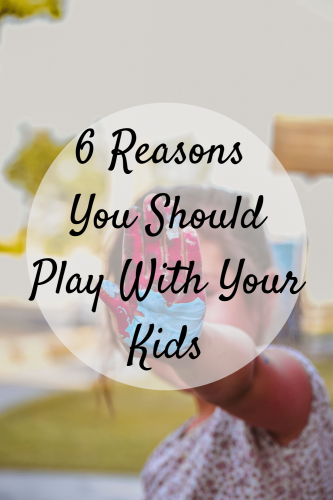
Adults caregivers are tasked with providing for their children and ensuring their safety and well-being. Many parents and guardians will spend time with their children daily, whether driving them to school or having family dinner time.
A crucial yet undervalued part of any child’s life is playing. Children love to play, and their parents love to watch them enjoy themselves!
There’s evidence to suggest that free and guided play allows children to learn language skills and math and spatial skills. These skills build the foundation for learning and brain development in the future.
Let’s face it — many parents and guardians are busy during the week and often struggle to find time to play with their children. However, the benefits of adult and child play certainly outweigh the drawbacks. Setting aside even an hour of playtime each day could make a world of difference in a child’s life.
Below are some specific ways play benefits children and why you should consider weekly play sessions with your child.
1. It Strengthens Your Emotional Bond
From an early age, children become attached to the adult or adults who care for them. Developing and fostering that connection takes effort from the child and the adults who care for them.
As children grow up, each interaction with an adult builds a sense of trust and dependency. Ensuring those interactions are positive is essential in supporting their overall development.
Take time to play pretend or encourage your child to use their imagination. Interactive play will deepen the bond you have with each other and be fun at the same time!
2. It Encourages a Healthy Lifestyle
Playing outdoors provides children with exposure to the outside world as well as what nature has to offer! Whether it’s through sports or just a simple game of tag, playing outside helps kids understand why moving and exercise are important in life.
Children can reap the benefits of playing outside with adult supervision. Improved hand-eye coordination comes from throwing and catching a ball. Running around builds children’s muscles and increases their stamina.
Playing outside is an excellent opportunity for children to get enough exercise during the day. Explaining the importance of exercise to your children will make it more likely for them to adopt this as they grow older.
3. It Teaches Vital Social Skills
Before entering preschool, kids may not be around other children often. For them to build friendships naturally when the time comes, play with them!
Children learn by mirroring adults, so engaging in play and starting conversations regarding play will help them learn this skill for themselves.
Social skills can be taught and sometimes come naturally to children. Once they enter school, they’ll be ready to interact with their peers.
4. It Improves Kids’ Confidence
As children begin interacting with other children, it’s normal for them to be shy at first. Understanding that there are other kids their age may even come as a shock to them! However, if they’re engaged in play with you, they’re more likely to have more confidence during those first interactions.
It can be scary for a child to enter school for the first time and see brand-new faces. Young children that are more timid may struggle to introduce themselves and begin playing. Put yourself in their shoes — you can understand why it may be overwhelming.
Teaching confidence through play may seem like a daunting task. Still, it’s certainly possible to notice the changes once kids become more confident. Their personality becomes more prevalent, and you’ll begin to see their quirks.
Maybe they prefer a style of play, such as playing dress-up, or more interactive play like pretending to serve you for dinner. There are so many ways to play that one or more will be sure to improve your child’s confidence.
5. It Benefits Children and Adults Alike
We’ve spent time focusing on benefits play offers to children, but you may notice changes in your own behavior as well.
For some parents, the idea of entering a play state of mind can seem challenging. With practice, it’s possible to incorporate play into your daily or weekly routine.
Try to imagine yourself as a child again! Give it some time and be patient. Soon enough, playing with your child will come easily, and you’ll appreciate what it means to be a kid again.
Children can play with more than just parents, too! Many households are multi-generational, so if older adults or grandparents are in the house, emphasize the importance of your child’s development. Encourage family members of all ages to participate in play.
6. It Prepares Children for an Academic Setting
A lot of play that children participate in relies on pretend scenarios, such as playing family or school. Children may struggle as they get used to an academic environment.
Whether it’s preschool or kindergarten, you want them to feel comfortable and ready to learn. Do your best to explain to your child how school works and what they can expect when they enter their classroom.
Before enrolling your child, feel free to simulate the experience of a classroom at home. Having your child sit at a table to learn can be fun and rewarding — and it’s so easy!
Assign them simple, age-appropriate tasks. If a child is young, maybe ask them to color or have them identify letters or numbers. The options are limitless when it comes to pretend play!
The Benefits of Play
Finding time to play with your kids is beneficial for them and your family. And because play requires creativity and imagination, there’s no right or wrong way to play.
Any method works, and as long as children are engaged, having fun, and learning, it’s effective. Try your best to schedule at least an hour of playtime during the day to reap these benefits.





Leave a Reply